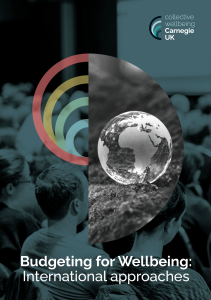Governments and societies across the globe are increasingly recognising the importance of improving the wellbeing of their citizens and making this the central goal of their economic and policy ambitions. At Carnegie UK, we believe that putting wellbeing approaches at the heart of decision making can focus public policy on ensuring everyone has what they need to live well now, and into the future. However, we also know that turning this ambition into reality is not straightforward.
This report was commissioned because systemic and tangible changes to how governments raise and allocate their financial resources remain limited, despite significant domestic and international progress in developing frameworks and measures for wellbeing policy aims. There is a pressing need for practical and actionable guidance to support governments in this respect. We identified a critical gap: how can fiscal policy – through revenue raising, spending, and budgetary processes – be reimagined to prioritise and deliver improved wellbeing for people?
This paper examines global examples from places including New Zealand, Australia and South Korea; innovative tools; and emerging practices that have the potential to transform public spending from an all too often reactive, short-term and siloed exercise into a lever for the pursuit of long-term wellbeing.







